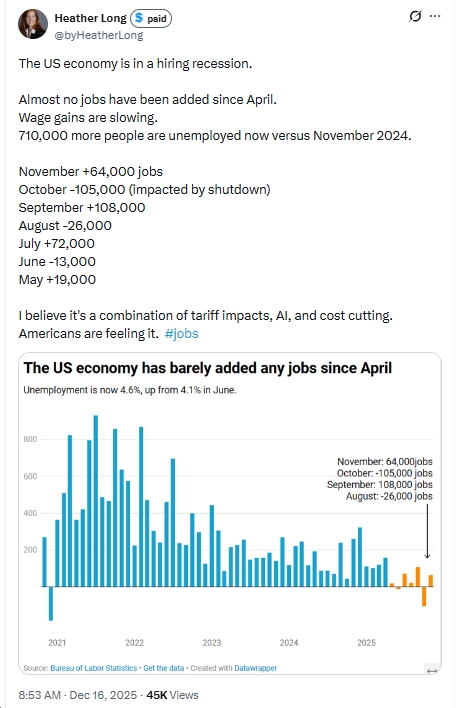UPDATE:The mania for budget-cutting is already adversely impacting the economy in the UK, where the new prime minister’s threats of austerity have caused business confidence to plummet: reported here
President Obama has appointed a commission to examine the deficit, signaling that he has accepted the conservative view that the government’s spending is out of control and threatening to force the United States into bankruptcy. The composition of the commission, is such that progressives believe, probably correctly, that it will recommend slashing “entitlements” like social security, and killing any idea of spurring economic recovery through government spending like the New Deal under FDR.
In other words, the change Obama promised in the campaign has mutated into something conservative, not progressive, in a total triumph of the anti-Keynesianism of the Free Marketeers and Wall Street—- Goodbye to promises made to Main Street, Hello to the so-called fiscal discipline, anti-labor, pro-big business philosophy of Friedmanism and an only partially-understood version of the Austrian school of economics.
Not everyone agrees that now is the time to cut federal government spending, or that the deficit is utterly out of control or, that, to protect our grandchildren from crushing federal debt payments, this is the moment to take up the cheese-paring ways of the No-Tax crowd. In fact, this may well be the exact time when applying stringent fiscal discipline is precisely the wrong thing to do.
As it happens, the World Bank imposed this tight spending discipline over the past four or five decades on countries in the Third World when they needed a loan to rescue them from reckless or mis-directed spending. The policy had absolutely devastating effects upon the economies and the societies of those countries (see Naomi Klein’s The Shock Doctrine: the Rise of Disaster Capitalism). The Bank demanded not only ruthless spending cuts but imposition of Friedman’s Free Market de-regulation rules on, resulting in the devastation of local industry. While Western economists lauded the results of World Bank policies, the locals regarded the results as a new form of colonialism because global corporations took over their economy, unraveling their culture, devastating all classes except their elites, who benefitted.
The Free Marketeers, having taken over the Republican Party in toto, as well as Blue Dog Democrats, and apparently having converted President Obama, are rubbing their hands in anticipation: it is now the turn of the United States to be forced to take the same medicine as Argentina and other third world nations(and, more recently, Greece); i.e., ruthless fiscal policies devastating to America’s middle class while benefitting the elites, Wall Street, and megacorporations.
Not so fast.
Steven Pearlstein in Friday’s Washington Post, 11 June 2010, tackled the deficit question in terms of recovering from the persistent Great Recession. He says it is no wonder we average citizens are confused about the economy—– so are the supposed experts: *Some look at the published statistics and see a sustainable recovery;
*some look at low inflation rates (below one percent) and fear deflation;
*some look at huge government deficits and warn about coming hyper-inflation’
*others want more Keynesian fiscal stimulus to create jobs, and
*still others are relying on the rapidly developing countries like China and Brasil to pull the US out of recession.
There is, in other words, no consensus about “where we are headed and what we should do next.”
According to Pearlstein, the bill is now coming due for America’s years of living high on the hog on unlimited credit. We have postponed payment for so many years, we are now left with just a few dismal ways to pay up:
1) “an extended period of subpar growth and high unemployment,”
2) “inflation that erodes” our purchasing power and the value of our assets, and/or
3) a “deflationary spiral that grinds down wages and increases our debt burden.”
Whatever decisions we make about these three ways “will have a big effect on how the burden is distributed—- between debtors and creditors, importers and exporters, those with lots of wealth and those with little, workers with market power and those without.”
This is where President Obama’s commission on the deficit becomes of all-consuming importance; it appears to be loaded against the little guy debtor, labor, and the middle class. Therefore, the recommendations it makes will undoubtedly be weighted in favor of those with lots of wealth. Mr. Pearlstein laments that those leading us have not been more candid about the reality of our situation, and about the limits of what government can (or should) do. Unfortunately, Ben Bernanke, who neither foresaw the recent meltdown nor acknowledged that the Fed’s loose monetary policies caused the bubble-collapse in the first place, is continuing to do what caused the collapse by keeping interest rates near zero, hoping to stimulate a recovery.
Another economist, Raghuram Rajan (former chief economist of the International Monetary Fund) warns us that keeping interest rates near zero in America has not increased output here significantly, but is causing “hot money” to flow abroad; this, I might add, further distorts the world economy and, in effect, delays recovery. Pearlman complains that the Obama administration has turned control of economic policy over to political advisors, so that conservatives and Blue Dogs are framing the debate in terms of deficit reduction rather than economic recovery.
Where we seem to be headed is to choose ruthless austerity and the classic World Bank punishments, just like the stringent “reforms” being imposed on Greece. The true classical
Austrian economist viewpoint, reflected in the investment advisory newsletter Richebacher Letter on 11 June trenchantly observes that such policies are designed to benefit only the very rich and the big banks, and inevitably have unintended (or ignored) consequences:
“….public debt default may be averted by tax cuts and government spending slashes, but to those not yet theologically committed to balanced fiscal budgets as the One True Moral Way, the aversion of public debt default will undoubtedly be bought at the price of escalating private debt default”
because
“When the government sucks cash flow out of the domestic private sector with these “fiscally correct” measures, those households and firms most leveraged face a much higher probability of debt distress and default.”
There are, by definition, two sides to a transaction, and what we have here is simply double-entry bookkeeping. Federal fiscal austerity saves the big banks and the wealthy (who are creditors) by devastating small businesses, workers, and the tax-paying middle class. It is, I would say, the Ultimate Bailout. Says Richebacher, “increases in the government fiscal balance must be accompanied….by an equal and offsetting decrease in the private sector financial balance.”
So much for attempting deficit reduction in the midst of an anemic “recovery.” Unless, of course, you prefer to crush the middle class in order to give more of the nation’s wealth to the already super-rich and the big financial institutions that caused our present woes.
What Pearlman recommends is that we seize the current advantage of low interest rates and slack in the economy by borrowing even more to
“re-build the foundations for long-term economic growth. At this point, neither the politics nor the economics support the idea of spending large sums, directly or through tax breaks, just to shave a percentage point off this year’s unemployment rate…. this is the ideal time to borrow and invest heavily in public infrastructure that has been badly neglected over the past 30 years.”
Projects, he says, would include not just the usual roads-and-bridges, but “airports, air traffic control, urban transit, high-speed rail, schools, universities, national laboratories, national parks, “smart” electric grids, broadband networks, green generating plants, and health information networks.”
This kind of government spending has tremendous long-term economic payoffs. True, along with that legacy will comethe obligation to pay off the debt, but the resulting growth will help pay it off.(In contrast to Republican tax cuts, which have not created true growth). Now that the economy has been more or less stabilized by President Obama’s first, it is time, says Pearlstein, to “settle up and get on with the more exciting challenge of shaping our long-term economic future.”
Can the deficit reduction commission, Mr. President. Remember the folks who elected you. Be progressive, don’t fall for the greedy Wall Street shills and their self-serving (but failed) economic theories.
.



![Thursday News: “Europe draws red line on Greenland after a year of trying to pacify Trump”; “ICE Agent Kills Woman, DHS Tells Obvious, Insane Lies About It”; “Trump’s DOJ sued Virginia. Our attorney general surrendered”; “Political domino effect hits Alexandria as Sen. Ebbin [to resign] to join Spanberger administration”](https://bluevirginia.us/wp-content/uploads/2026/01/montage010826.jpg)













